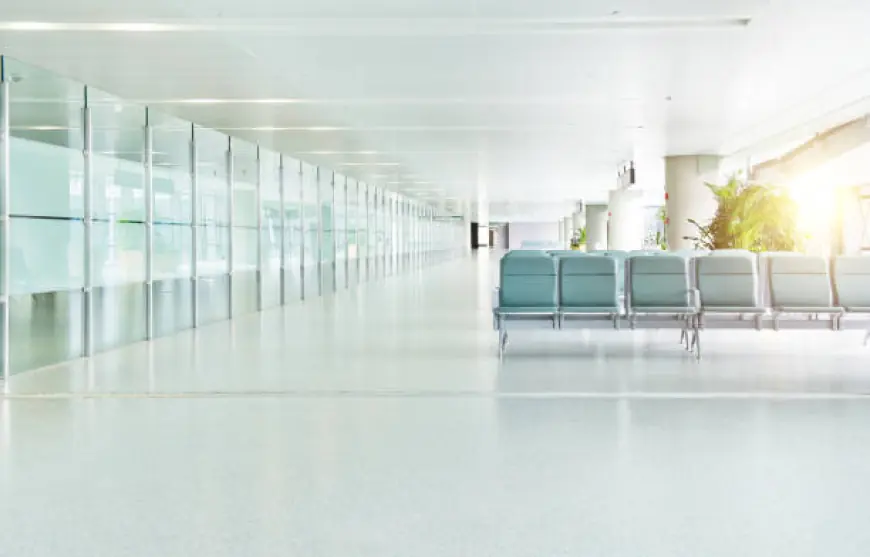How to Choose the Right Flooring for Hospitals and Healthcare Facilities
Flooring in hospitals and healthcare facilities is more than just decoration. It plays a big role in safety, hygiene, and durability.

Flooring in hospitals and healthcare facilities is more than just decoration. It plays a big role in safety, hygiene, and durability. Every day, patients, staff, and visitors move across floors that face heavy traffic, spills, and constant cleaning.
Choosing the right flooring can make a huge difference in keeping the environment safe and functional. Many facilities in New Jersey rely on healthcare flooring experts to guide their flooring choices.
Experienced hospital flooring contractors help ensure materials, installation, and maintenance meet the facility’s needs.
Why Flooring Is Important in Healthcare
Slips and falls are common accidents in hospitals. According to the National Safety Council, falls in healthcare settings cause nearly 30% of non-fatal injuries among staff and patients. The right floor can reduce this risk. It should provide good traction, support medical equipment like wheelchairs and beds, and stand up to heavy foot traffic.
Hygiene is another priority. Hospital floors must resist bacteria, mold, and chemicals used for cleaning. Floors that absorb moisture or are hard to clean increase infection risks. This is why options like vinyl flooring installation for hospitals or other easy-to-clean surfaces are often chosen. Certain areas, such as labs or pharmacies, may even require pharmaceutical flooring solutions for stricter hygiene standards.
Factors to Consider When Choosing Flooring
1. Durability
Hospital floors face constant use from staff, patients, carts, and medical equipment. Materials need to hold up for years without losing appearance or function. Vinyl, rubber, and linoleum are popular because they are durable and easy to maintain.
2. Hygiene
Cleaning is a daily routine in healthcare. Floors must resist moisture, spills, and strong cleaners without getting damaged. Vinyl and rubber are preferred because they allow for thorough cleaning and help reduce bacteria growth. Facilities using pharmaceutical flooring solutions can meet even higher hygiene standards in sensitive areas.
3. Safety
Slip resistance is essential. Textured finishes or coatings on floors help prevent accidents. Floors should also feel comfortable underfoot for staff who stand for long hours. Proper flooring reduces fatigue and keeps staff safe.
4. Noise Reduction
Hospitals need quiet environments. Flooring that absorbs sound creates calmer spaces for patients and staff. Rubber and cushioned vinyl are known for reducing noise, making them ideal for hallways and patient rooms.
5. Appearance
While safety and hygiene are most important, appearance still matters. Floors should fit the facility’s design and create a welcoming atmosphere. Colors can help designate zones for patient care, labs, or administrative areas.
Popular Flooring Options for Healthcare
● Vinyl Flooring
In hospitals, vinyl flooring installation is common. It is durable, easy to clean, and available in many colors and patterns. Vinyl also provides some cushioning, reducing fatigue for staff and minimizing noise.
● Rubber Flooring
Rubber is durable, slip-resistant, and easy to maintain. Its cushioned surface is comfortable for long shifts and helps prevent injuries from falls. Rubber works well in corridors, waiting areas, and nurses’ stations.
● Linoleum
Linoleum is eco-friendly and naturally anti-bacterial. It is easy to clean and lasts a long time. Linoleum works well in patient rooms and labs, providing a professional and safe surface.
Sustainability and Eco-Friendly Options
Hospitals are increasingly choosing flooring that is eco-friendly and sustainable. Materials like linoleum and certain types of vinyl are made from renewable resources and can often be recycled at the end of their life.
Sustainable flooring helps reduce the hospital’s environmental footprint while also supporting healthier indoor air quality. Using eco-friendly options does not compromise durability or hygiene, making them practical for high-traffic areas.
Choosing green flooring demonstrates a facility’s commitment to both patient safety and environmental responsibility.
Working with Experts
Choosing the right floor is not just about material. Experienced hospital flooring contractors assess traffic, hygiene needs, and cleaning requirements. They recommend the best materials and installation methods. Many hospitals rely on healthcare flooring specialists in New Jersey to make sure floors meet safety and regulatory standards.
Specialized areas, like labs or pharmacies, may need flooring solutions for chemical resistance and hygiene. Professional installation ensures floors perform well for years and reduces future maintenance costs.
Maintenance and Longevity
Even the best hospital floors need regular care to stay safe and functional. Daily cleaning is essential to remove dust, dirt, and spills that can cause accidents or damage the surface. Prompt attention to spills prevents stains and reduces the risk of slips.
Routine inspections help spot worn areas or damage early, allowing timely repairs before problems worsen. Vinyl and rubber floors are generally low maintenance, but it’s important for staff to follow proper cleaning procedures and use recommended cleaning agents.
Regular upkeep not only preserves the appearance of the floor but also ensures hygiene, prolongs its lifespan, and keeps patients, visitors, and staff safe.
Final Word
Choosing the right flooring for hospitals and healthcare facilities requires balancing safety, hygiene, durability, and comfort. Healthcare flooring experts and hospital flooring contractors help guide these decisions. Vinyl, rubber, and linoleum are popular for their durability and cleanliness.
For sensitive areas, custom pharmaceutical flooring solutions provide extra protection. Proper installation and maintenance keep floors safe, clean, and long-lasting, supporting the well-being of patients, staff, and visitors every day.
What's Your Reaction?
 Like
0
Like
0
 Dislike
0
Dislike
0
 Love
0
Love
0
 Funny
0
Funny
0
 Angry
0
Angry
0
 Sad
0
Sad
0
 Wow
0
Wow
0

















































